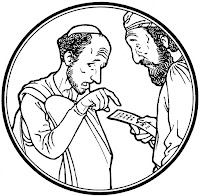CLICK HERE for the audio file.
CLICK HERE for the video file.
Stewardship in the “Sons of Light”
Grace to you and peace from God our Father, and from our Lord and Savior Jesus Christ. Amen.
Why would Jesus deliver this parable? Surely He did not approve of the unrighteous servant who cheated his master, whose hand was caught in the cookie jar. And when he is about to lose his job, he sees to his own future by again stealing from his master. Jesus could never approve of such behavior. So why does He set this parable before us?
The point Jesus is making here is that unbelievers are often much more adept at using the things of the world to their advantage than Christians are at using the gifts of God for love and the service of their neighbor. The sons of this world far surpass us when it comes to a single-minded devotion to gaining advantages for themselves in this life than we are in using God’s gifts for the good of our neighbor and the Church. Jesus wants His hearers to imitate that steward, of course—but not in the unrighteousness that knows how to bend the rules and beat the system. Instead, the “sons of light” are to be shrewd in recognizing that their true riches are found in heaven, and that their focus needs to be where their hope truly lies: in Jesus Christ, the Son of God.
God may bless you with wealth, but not so that you can act as if it is all yours. That is how unbelievers treat the gifts of God. But you are children of your heavenly Father, and you really know better. And so, just as the unrighteous steward shrewdly obtained earthly benefits for himself, we should be just as shrewd in being assured of eternal benefits in heaven. Not a single possession we have is our own; it belongs to another, to God. The words of the Psalmist are as true as any words can be: “The earth is the Lord’s, and the fullness thereof, the world and those who dwell therein...” We are all stewards, and we, too, will give an account of the gifts entrusted to us.
What is important, then, is not how much we have, but what we do with what we have. We will use the gifts of God in either righteous or unrighteous ways. When we have more than we need and refuse to use it in service to God and love for our neighbor, such things can become unrighteous. As Jesus said: “If then you have not been faithful in the unrighteous wealth, who will entrust to you the true riches? And if you have not been faithful in that which is another’s, who will give you that which is your own? No servant can serve two masters, for either he will hate the one and love the other, or he will be devoted to the one and despise the other. You cannot serve God and money.”
The steward in our text was intent on providing for himself alone. Are we really any better? Just as the children of the world often set good examples for us in terms of their shrewdness and persistence, so we, who are the baptized of God, are called to do no less in the realm of spiritual things. We are to be equally shrewd in the things God gives us—not in the way of that unrighteous steward, to be sure, but in the way of Christ: not selfishly, but selflessly.
Still, this parable has something more to say to us, and this is really the most important thing it teaches us. Part of the steward’s shrewdness was his confidence in the mercy of his master. He believed rightly that his master would be merciful to him, though he was certainly under no obligation to be merciful. He believed his master to be a man of generosity and forgiveness. He staked his future on that. And he did well; it was a faith his master praised. So we, too, trust that our Master is a God of mercy. And He truly is that as He forgives all our debts through Jesus, that we may be received into our eternal home. In this our hope is certain, that God, who is both faithful and just, forgives our sins and cleanses us from all unrighteousness. We believe that our heavenly Father is merciful to us because of the debt paid on our behalf in the sacrifice of Jesus Christ, His Son. And it is that faith, above all, that our heavenly Father desires and praises.
Though we have often squandered and misused our Father’s gifts in selfishness and sin, Jesus, who is the righteousness of God, has cancelled our debt, knowing that His forgiveness will be honored by the Father because of His holy suffering and death upon the cross. Jesus made eternal friends of us, not by hoarding things for Himself, but by paying the ultimate price for us, that we might know and receive the riches of His mercy. Jesus relied on the mercy of His Father, and He was not disappointed. He trusted that His Father would honor His death in our place. And because He did, you may now take your bill and write, “Paid in full.” Your books are balanced, your account justified. You will receive an everlasting home! In the name of the Father and of the Son (+) and of the Holy Spirit. Amen.
The peace of God which passes all understanding will keep your hearts and minds in Christ Jesus always. Amen.








No comments:
Post a Comment